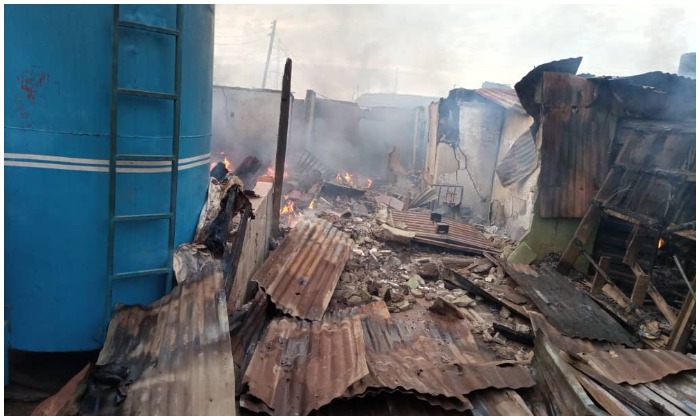Landlords and residents on Cardoso Road, Baruwa, in the Ipaja area of Lagos State, have been thrown into mourning after a wave of gas explosion rocked
Landlords and residents on Cardoso Road, Baruwa, in the Ipaja area of Lagos State, have been thrown into mourning after a wave of gas explosion rocked the community, killing eight people.
Among the dead were a landlady, a woman and her two sons, and a security guard. Eight others, who sustained varying degrees of injury, were rushed to the Trauma and Burns Centre, Gbagada General Hospital, Gbagada. One of them later passed away. No fewer than 25 houses and 16 shops were destroyed by the explosions, which started around 5am on Thursday. Other facilities affected were a private primary school, an events centre and a church, while three vehicles were also burnt.
A few cursed the owner of Best Roof Gas Station, the gas plant, where the fire started from. A 30-metric-tonne LPG tanker was discharging gas into the underground tank around 4am when the pipe leaked. A generator used to power the premises was said to have ignited the fire.
A worker at the Baruwa plant, Ibikunle Israel, said a tanker had earlier discharged without any incident. He explained that after workers closed for work around 7pm, the second gas tanker came in.
“We don’t know whether the driver and the motor boy tried to do it themselves. But that was how the gas pipe leaked,” he added.
The Chairman of the Community Development Association in Baruwa, Fagbemigun Samuel, recalled that at the initial stage, the area was filled with gas. He said, “Someone came to bang on my door, saying I should come out because of a gas leakage. I came out and saw that the whole street was white as if there was a harmattan. Some residents put disused tyres on the road to stop vehicles from moving and igniting the fire. I went back inside to put on my trousers; but by the time I came out, there was fire already. People were in panic. I took my wife to escape. When I returned, the whole street was in flames with nowhere to go again.”
The Administrative Manager of Little Tikky Nursery and Primary School, Josiah Samuel, said vital documents, new textbooks, uniforms and cardigans worth over N1m were destroyed.
“The question is, who gave the gas plant approval within a residential area?” he queried.
A youth leader, Chief Jide Osokoya, said the community already had a premonition of the incident, adding that when the gas plant was established about five years ago, the residents protested against it. Osokoya said the owner of the gas plant, identified as Larafat Fashola, brought out approval papers from the government.
He said, “This is purely a residential and not an industrial area. In industrial areas, there are materials prepared for such. But we had to wait for about three hours before the fire service got here. But we were told that the man had approval from the DPR and the state government. As law-abiding citizens, we became incapacitated. But we knew it would be calamitous.”
An elder of the Fountain of Life Evangelical Mission, Ibrahim Obey, insisted that the government was complicit in the disaster. Obey, whose church’s ceiling was pulled down by the impact of the explosion, wondered why the government would seal off the place of worship after the incident.
“We went to court against the owner of the gas plant, but he won against us, because he got approval from the state government. So, what did we do? The government now came and locked the church because of the explosion,” he said.
A landlady, Idowu Afolabi, also recalled how Baruwa landlords organised a protest march against the gas plant.
The state Commissioner of Police, Hakeem Odumosu, while sympathising with the families of the victims, condemned the gas plant operator for violating the law.
Governor Babajide Sanwo-Olu, in a statement, expressed sadness over the explosion. He said preliminary and final reports on the cause of the explosion suggested negligence on the part of the gas plant operator, adding that the government would take stiffer measures against operators of gas plants and combustible items in the state.
Punch
